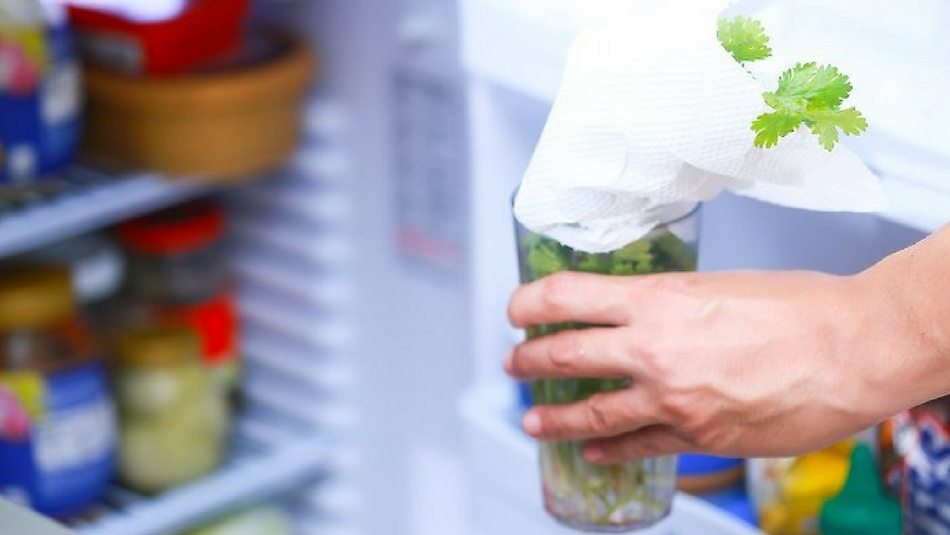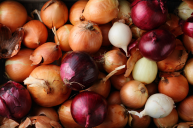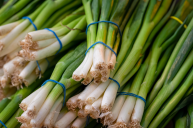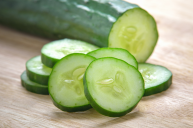I fall into the habit of buying a bunch of produce from the grocery store or farmer's market and just throwing most of it in the refrigerator. For the longest time I thought the refrigerator was the best spot for all of my vegetables and aromatics to keep them as fresh as possible. For some things it is, but for others, that might not be the case. Sometimes it's best to keep certain fresh produce far away from the refrigerator so they last longer.
Videos by Wide Open Country
It can be confusing to figure out how to store vegetables, but we're here to help. Most vegetables are best stored certain ways to ensure that they stay and so you don't have to worry about throwing away produce. Hey, it can be expensive. Here's a helpful list of how to properly store your favorite vegetables and aromatics that might just surprise you!
1. Asparagus
This picture says it all. The best way to store asparagus is to treat them like fresh cut flowers. Try and find bright green asparagus that are firm throughout as well.
Trim about an inch off the edge of the asparagus (keeping the rubber band on will help hold them all together while you trim) and stand them up in a glass with about two inches of water. Store them in the refrigerator with a plastic bag tied around them so they don't take on any other flavors floating around in the refrigerator.
If you notice the water becoming cloudy, just be sure to change it.
2. Fresh Herbs
I love keeping herbs around in my kitchen, but it's such a shame when they go bad and get all slimy and change colors. Using a similar method to the one above, you'll have fresh herbs around much longer. And don't they look all pretty in those mason jars?
Freezing fresh herbs: If you have fresh herbs like basil and cilantro, that you know you're not going to use and do not want to throw away, try chopping them up and storing them in individual baggies in the freezer.
They might not taste as good as fresh herbs, but they won't go to waste! And you'll always have herbs on hand when you need it.
I also love the idea of placing fresh herbs into an ice cube tray and pouring olive oil over each one. Store the tray in the freezer and use each cube when making a sauce, soup, casserole or your favorite dish.
3. Potatoes
Keep those spuds out of the refrigerator! Potatoes do not need to be store in cold temperatures. Simply just store them in a bag or a dark environment at about 50 degrees Fahrenheit.
Be careful to keep them from a humid or warm environment because they will have a tendency to go bad or sprout quickly. Potatoes should keep for several months if stored properly.
This also relates to another delicious root vegetable such as sweet potatoes. Make sure to keep them away from cold temperatures.
4. Broccoli
Broccoli is one of my favorite vegetables, but storing it in one of the refrigerator drawers takes up so much space and nearly impossible to take out when needed. Maybe it's just me but almost every time the drawer gets stuck.
Storing broccoli like a flower bouquet will take up less drawer space and look kind of nice, too. Just trim the bottom of the broccoli stalk and place in a jar of water. Kept in the refrigerator and it will stay fresh longer. Just like the asparagus, if you notice the water looking cloudy, be sure to change it for the best flavor and freshness.
5. Onions
Just like potatoes, onions do not require any refrigeration. The cold temperature from the refrigerator will soften the onions, so it's best to keep them in a cool dark place in a mesh bag or brown paper bag away from direct sunlight.. If you do store them in a brown paper bag, make sure to punch holes through the bag for good air flow.
Helpful tip: Remember to keep potatoes and onions far away from each other! Storing together will cause them to spoil faster. But definitely keep them together when you're making breakfast, specifically hash browns!
6. Garlic
When purchasing garlic, it's important that the bulb is firm with no softness and that it still has its papery skin. Keep garlic out of the refrigerator and store in a paper bag with holes or in a basket on the counter in a cool, dry environment. Preferably in a spot where there is shade.
Do not store garlic in a plastic bag or container because it will cause the garlic to sprout and mold. The bulb of garlic has a pretty long shelf life (about 8 weeks), but once the cloves are broken off from the bulb, they have a shorter shelf life (about 3-10 days).
7. Lettuce
To extend the life of your lettuce, try this simple method so it doesn't go to waste anymore! You'll want to wash your lettuce under water and if you have one, use a salad spinner to release any extra water. If you don't have a salad spinner, just pat it dry with a paper towel as best as you can.
Wrap the clean lettuce in a paper towel and place in a plastic bag or container and store in the crisper drawer in the refrigerator. If you notice the paper towel to be especially wet, just replace it with a new one.
You can also use this with heads of lettuce. Just wrap the lettuce in a damp paper towel and keep in the refrigerator. You'll have fresh, crisp lettuce every time you make your favorite salad.
This process will also work other dark leafy greens like: kale, collards, Swiss chard and fresh spinach.
8. Tomatoes
I know, technically tomatoes aren't a vegetable, but it's still useful to know how to store them, right? It's best to keep them away from the refrigerator and store them in a bowl or an open container at room temperature. Or, if you're looking to brighten up the kitchen, they will look pretty displayed on a windowsill.
If you notice your tomatoes getting too ripe, then you can definitely store them in the refrigerator so they do not get too mushy.
9. Carrots
Carrots are a very healthy vegetable and there are many ways to cook with them. Keeping them fresh is simple and won't require much effort.
If the green tops are still attached to the carrots, make sure to remove them because they can give off excess moisture, which risks them spoiling faster. Store them unwashed in a bag in the refrigerator. Wash them just before using because again, the moisture will make them go bad. They should last this way for at least 10 days, sometimes even longer.
10. Mushrooms
There's nothing better to eat for me than sautéed mushrooms sitting on top of a juicy steak! I absolutely love vegetables, and for me, mushrooms (edible ones) are on the top of my list. They're earthy and full of flavor.
To store them properly, it's best to keep them in the refrigerator in a bag or container so they are able to breathe. Make sure to to wipe the dirt off with a damp paper towel. Avoid rinsing them under water. Mushrooms soak up liquid easily, which in the end will make them spoil faster than you would like.
11. Ginger
Ginger is a strong, but flavorful herb that is a great addition to many meals, marinades or baked goods. Ginger also has medicinal qualities like: relieving nausea, morning sickness, motion sickness, muscle pain, etc. Overall, it's a super healthy ingredient to have around!
Store a piece of firm ginger root in a sealed bag with the extra air let out in the refrigerator. Doing this should keep your ginger fresh for weeks. Did you also know that ginger is really easy to grow? It's simple and inexpensive to grow it indoors and you'll have an endless amount of fresh ginger! Here are directions.
12. Green Beans
Green beans aka string beans are a tasty vegetable with many health benefits. They're loaded with vitamins and free fat, sodium and cholesterol. Did you know that they're super easy to grow too?
Unwashed, fresh green beans will last in the refrigerator crisper drawer in a bag or container for about 7 days. You can also freeze fresh green beans that are on the verge of going bad. Just steam them first for about 2 minutes and let them cool off in a bowl of cold water. Store them in the freezer for whenever you need them.
13. Zucchini and Squash
Store these delicious summertime veggies easily in your refrigerator. Just poke some holes in a plastic bag and store the summer squashes or zucchini for up to a week. Make sure to rinse off just before using rather than before placing them in the bag. The extra water might cause them to spoil.
Perfect for your favorite recipe!




